Career Planning: Development Theories and Personal Values
VerifiedAdded on 2023/06/11
|8
|1883
|183
AI Summary
This paper discusses career development theories and personal values of great leaders like Bill Gates and Steve Jobs. It also highlights the importance of balancing personal and professional lives.
Contribute Materials
Your contribution can guide someone’s learning journey. Share your
documents today.

Running head: CAREER PLANNING
Career Planning
Name of the Student
Name of the University
Author Note
Career Planning
Name of the Student
Name of the University
Author Note
Secure Best Marks with AI Grader
Need help grading? Try our AI Grader for instant feedback on your assignments.
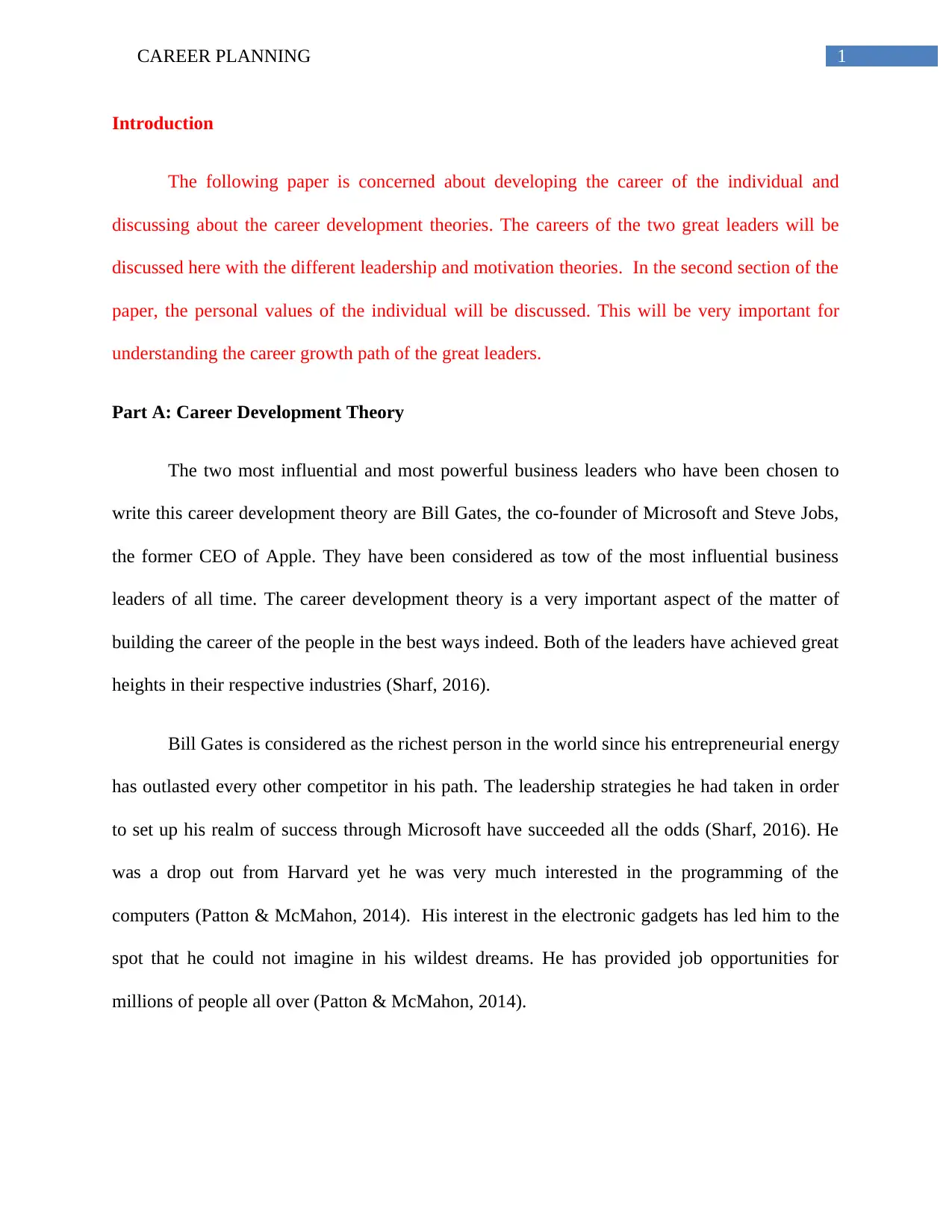
1CAREER PLANNING
Introduction
The following paper is concerned about developing the career of the individual and
discussing about the career development theories. The careers of the two great leaders will be
discussed here with the different leadership and motivation theories. In the second section of the
paper, the personal values of the individual will be discussed. This will be very important for
understanding the career growth path of the great leaders.
Part A: Career Development Theory
The two most influential and most powerful business leaders who have been chosen to
write this career development theory are Bill Gates, the co-founder of Microsoft and Steve Jobs,
the former CEO of Apple. They have been considered as tow of the most influential business
leaders of all time. The career development theory is a very important aspect of the matter of
building the career of the people in the best ways indeed. Both of the leaders have achieved great
heights in their respective industries (Sharf, 2016).
Bill Gates is considered as the richest person in the world since his entrepreneurial energy
has outlasted every other competitor in his path. The leadership strategies he had taken in order
to set up his realm of success through Microsoft have succeeded all the odds (Sharf, 2016). He
was a drop out from Harvard yet he was very much interested in the programming of the
computers (Patton & McMahon, 2014). His interest in the electronic gadgets has led him to the
spot that he could not imagine in his wildest dreams. He has provided job opportunities for
millions of people all over (Patton & McMahon, 2014).
Introduction
The following paper is concerned about developing the career of the individual and
discussing about the career development theories. The careers of the two great leaders will be
discussed here with the different leadership and motivation theories. In the second section of the
paper, the personal values of the individual will be discussed. This will be very important for
understanding the career growth path of the great leaders.
Part A: Career Development Theory
The two most influential and most powerful business leaders who have been chosen to
write this career development theory are Bill Gates, the co-founder of Microsoft and Steve Jobs,
the former CEO of Apple. They have been considered as tow of the most influential business
leaders of all time. The career development theory is a very important aspect of the matter of
building the career of the people in the best ways indeed. Both of the leaders have achieved great
heights in their respective industries (Sharf, 2016).
Bill Gates is considered as the richest person in the world since his entrepreneurial energy
has outlasted every other competitor in his path. The leadership strategies he had taken in order
to set up his realm of success through Microsoft have succeeded all the odds (Sharf, 2016). He
was a drop out from Harvard yet he was very much interested in the programming of the
computers (Patton & McMahon, 2014). His interest in the electronic gadgets has led him to the
spot that he could not imagine in his wildest dreams. He has provided job opportunities for
millions of people all over (Patton & McMahon, 2014).
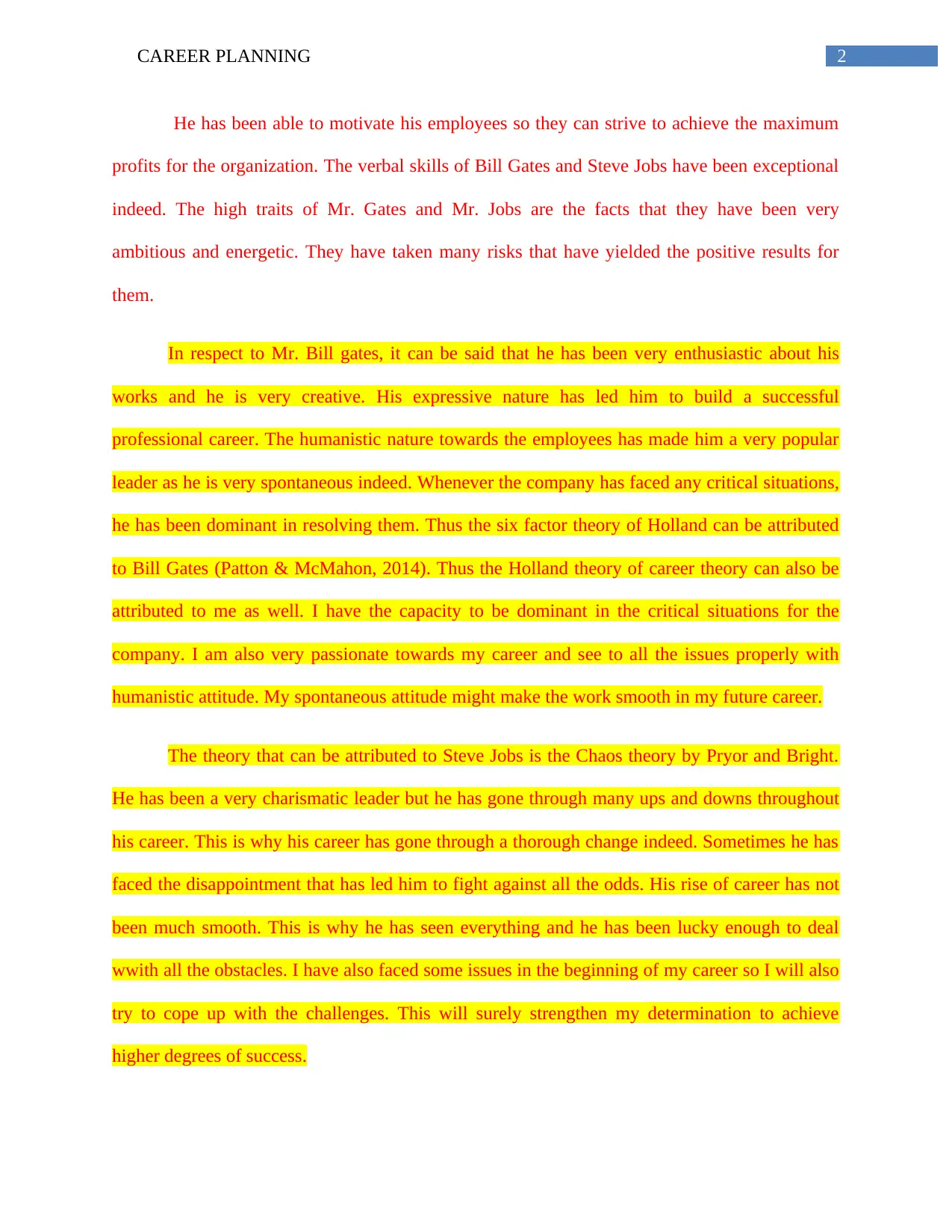
2CAREER PLANNING
He has been able to motivate his employees so they can strive to achieve the maximum
profits for the organization. The verbal skills of Bill Gates and Steve Jobs have been exceptional
indeed. The high traits of Mr. Gates and Mr. Jobs are the facts that they have been very
ambitious and energetic. They have taken many risks that have yielded the positive results for
them.
In respect to Mr. Bill gates, it can be said that he has been very enthusiastic about his
works and he is very creative. His expressive nature has led him to build a successful
professional career. The humanistic nature towards the employees has made him a very popular
leader as he is very spontaneous indeed. Whenever the company has faced any critical situations,
he has been dominant in resolving them. Thus the six factor theory of Holland can be attributed
to Bill Gates (Patton & McMahon, 2014). Thus the Holland theory of career theory can also be
attributed to me as well. I have the capacity to be dominant in the critical situations for the
company. I am also very passionate towards my career and see to all the issues properly with
humanistic attitude. My spontaneous attitude might make the work smooth in my future career.
The theory that can be attributed to Steve Jobs is the Chaos theory by Pryor and Bright.
He has been a very charismatic leader but he has gone through many ups and downs throughout
his career. This is why his career has gone through a thorough change indeed. Sometimes he has
faced the disappointment that has led him to fight against all the odds. His rise of career has not
been much smooth. This is why he has seen everything and he has been lucky enough to deal
wwith all the obstacles. I have also faced some issues in the beginning of my career so I will also
try to cope up with the challenges. This will surely strengthen my determination to achieve
higher degrees of success.
He has been able to motivate his employees so they can strive to achieve the maximum
profits for the organization. The verbal skills of Bill Gates and Steve Jobs have been exceptional
indeed. The high traits of Mr. Gates and Mr. Jobs are the facts that they have been very
ambitious and energetic. They have taken many risks that have yielded the positive results for
them.
In respect to Mr. Bill gates, it can be said that he has been very enthusiastic about his
works and he is very creative. His expressive nature has led him to build a successful
professional career. The humanistic nature towards the employees has made him a very popular
leader as he is very spontaneous indeed. Whenever the company has faced any critical situations,
he has been dominant in resolving them. Thus the six factor theory of Holland can be attributed
to Bill Gates (Patton & McMahon, 2014). Thus the Holland theory of career theory can also be
attributed to me as well. I have the capacity to be dominant in the critical situations for the
company. I am also very passionate towards my career and see to all the issues properly with
humanistic attitude. My spontaneous attitude might make the work smooth in my future career.
The theory that can be attributed to Steve Jobs is the Chaos theory by Pryor and Bright.
He has been a very charismatic leader but he has gone through many ups and downs throughout
his career. This is why his career has gone through a thorough change indeed. Sometimes he has
faced the disappointment that has led him to fight against all the odds. His rise of career has not
been much smooth. This is why he has seen everything and he has been lucky enough to deal
wwith all the obstacles. I have also faced some issues in the beginning of my career so I will also
try to cope up with the challenges. This will surely strengthen my determination to achieve
higher degrees of success.
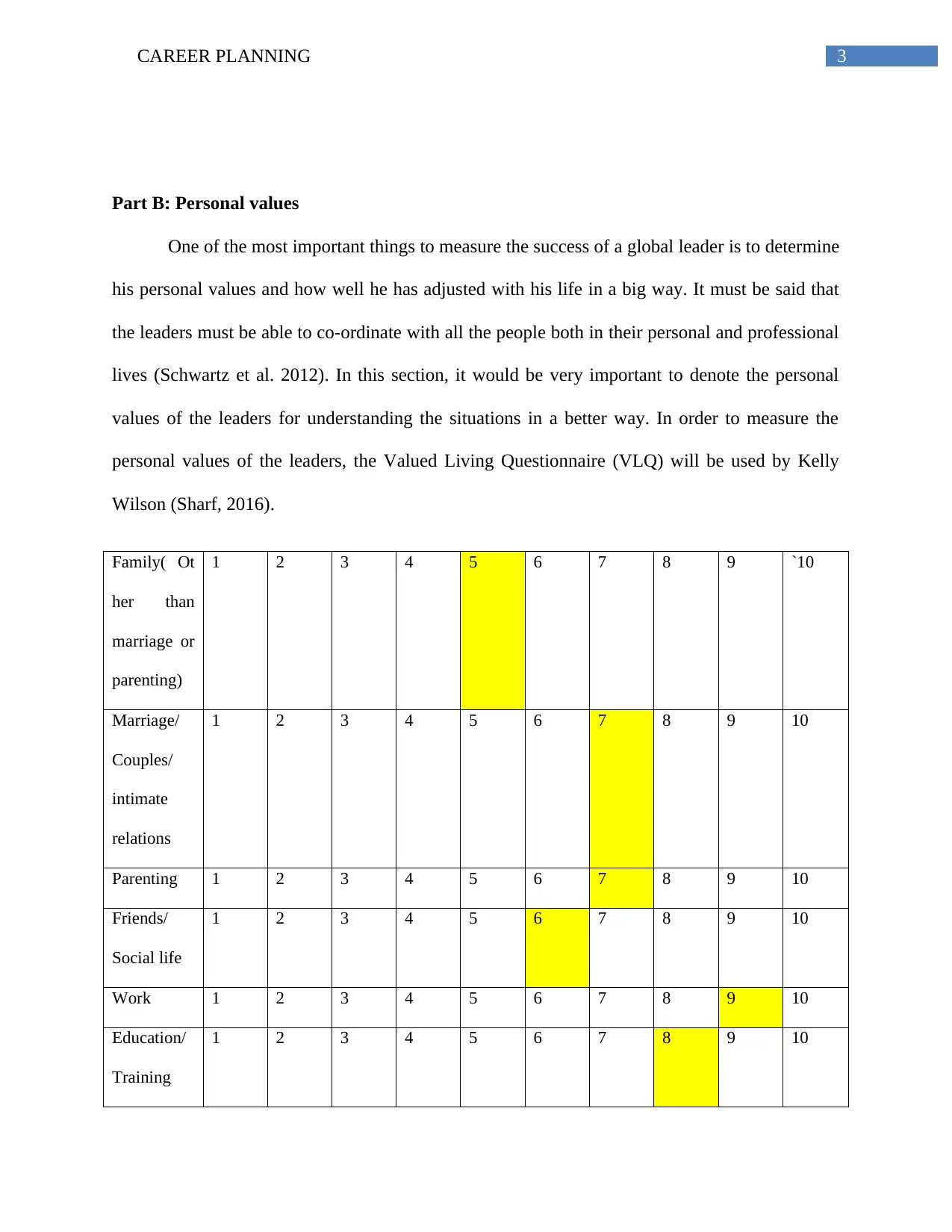
3CAREER PLANNING
Part B: Personal values
One of the most important things to measure the success of a global leader is to determine
his personal values and how well he has adjusted with his life in a big way. It must be said that
the leaders must be able to co-ordinate with all the people both in their personal and professional
lives (Schwartz et al. 2012). In this section, it would be very important to denote the personal
values of the leaders for understanding the situations in a better way. In order to measure the
personal values of the leaders, the Valued Living Questionnaire (VLQ) will be used by Kelly
Wilson (Sharf, 2016).
Family( Ot
her than
marriage or
parenting)
1 2 3 4 5 6 7 8 9 `10
Marriage/
Couples/
intimate
relations
1 2 3 4 5 6 7 8 9 10
Parenting 1 2 3 4 5 6 7 8 9 10
Friends/
Social life
1 2 3 4 5 6 7 8 9 10
Work 1 2 3 4 5 6 7 8 9 10
Education/
Training
1 2 3 4 5 6 7 8 9 10
Part B: Personal values
One of the most important things to measure the success of a global leader is to determine
his personal values and how well he has adjusted with his life in a big way. It must be said that
the leaders must be able to co-ordinate with all the people both in their personal and professional
lives (Schwartz et al. 2012). In this section, it would be very important to denote the personal
values of the leaders for understanding the situations in a better way. In order to measure the
personal values of the leaders, the Valued Living Questionnaire (VLQ) will be used by Kelly
Wilson (Sharf, 2016).
Family( Ot
her than
marriage or
parenting)
1 2 3 4 5 6 7 8 9 `10
Marriage/
Couples/
intimate
relations
1 2 3 4 5 6 7 8 9 10
Parenting 1 2 3 4 5 6 7 8 9 10
Friends/
Social life
1 2 3 4 5 6 7 8 9 10
Work 1 2 3 4 5 6 7 8 9 10
Education/
Training
1 2 3 4 5 6 7 8 9 10
Secure Best Marks with AI Grader
Need help grading? Try our AI Grader for instant feedback on your assignments.
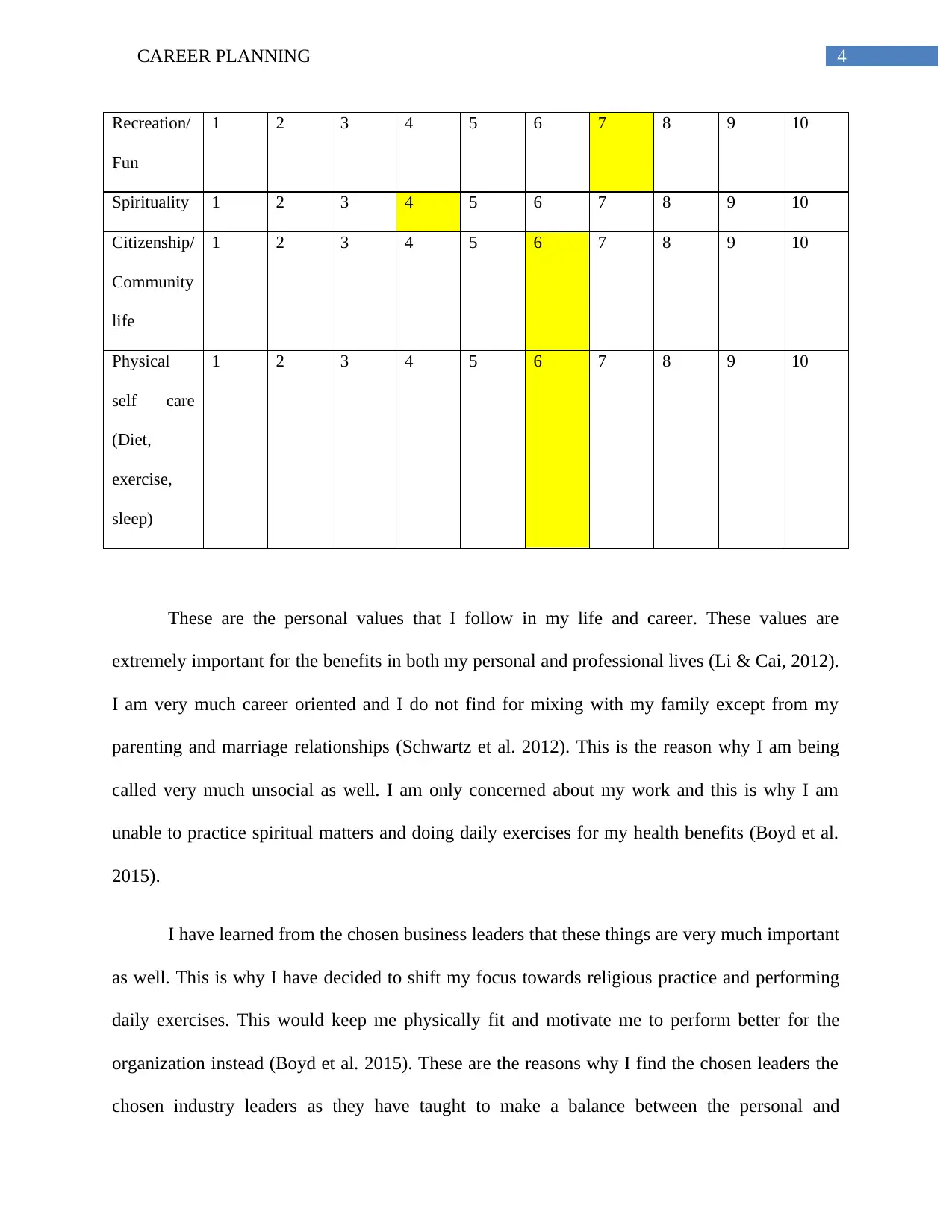
4CAREER PLANNING
Recreation/
Fun
1 2 3 4 5 6 7 8 9 10
Spirituality 1 2 3 4 5 6 7 8 9 10
Citizenship/
Community
life
1 2 3 4 5 6 7 8 9 10
Physical
self care
(Diet,
exercise,
sleep)
1 2 3 4 5 6 7 8 9 10
These are the personal values that I follow in my life and career. These values are
extremely important for the benefits in both my personal and professional lives (Li & Cai, 2012).
I am very much career oriented and I do not find for mixing with my family except from my
parenting and marriage relationships (Schwartz et al. 2012). This is the reason why I am being
called very much unsocial as well. I am only concerned about my work and this is why I am
unable to practice spiritual matters and doing daily exercises for my health benefits (Boyd et al.
2015).
I have learned from the chosen business leaders that these things are very much important
as well. This is why I have decided to shift my focus towards religious practice and performing
daily exercises. This would keep me physically fit and motivate me to perform better for the
organization instead (Boyd et al. 2015). These are the reasons why I find the chosen leaders the
chosen industry leaders as they have taught to make a balance between the personal and
Recreation/
Fun
1 2 3 4 5 6 7 8 9 10
Spirituality 1 2 3 4 5 6 7 8 9 10
Citizenship/
Community
life
1 2 3 4 5 6 7 8 9 10
Physical
self care
(Diet,
exercise,
sleep)
1 2 3 4 5 6 7 8 9 10
These are the personal values that I follow in my life and career. These values are
extremely important for the benefits in both my personal and professional lives (Li & Cai, 2012).
I am very much career oriented and I do not find for mixing with my family except from my
parenting and marriage relationships (Schwartz et al. 2012). This is the reason why I am being
called very much unsocial as well. I am only concerned about my work and this is why I am
unable to practice spiritual matters and doing daily exercises for my health benefits (Boyd et al.
2015).
I have learned from the chosen business leaders that these things are very much important
as well. This is why I have decided to shift my focus towards religious practice and performing
daily exercises. This would keep me physically fit and motivate me to perform better for the
organization instead (Boyd et al. 2015). These are the reasons why I find the chosen leaders the
chosen industry leaders as they have taught to make a balance between the personal and
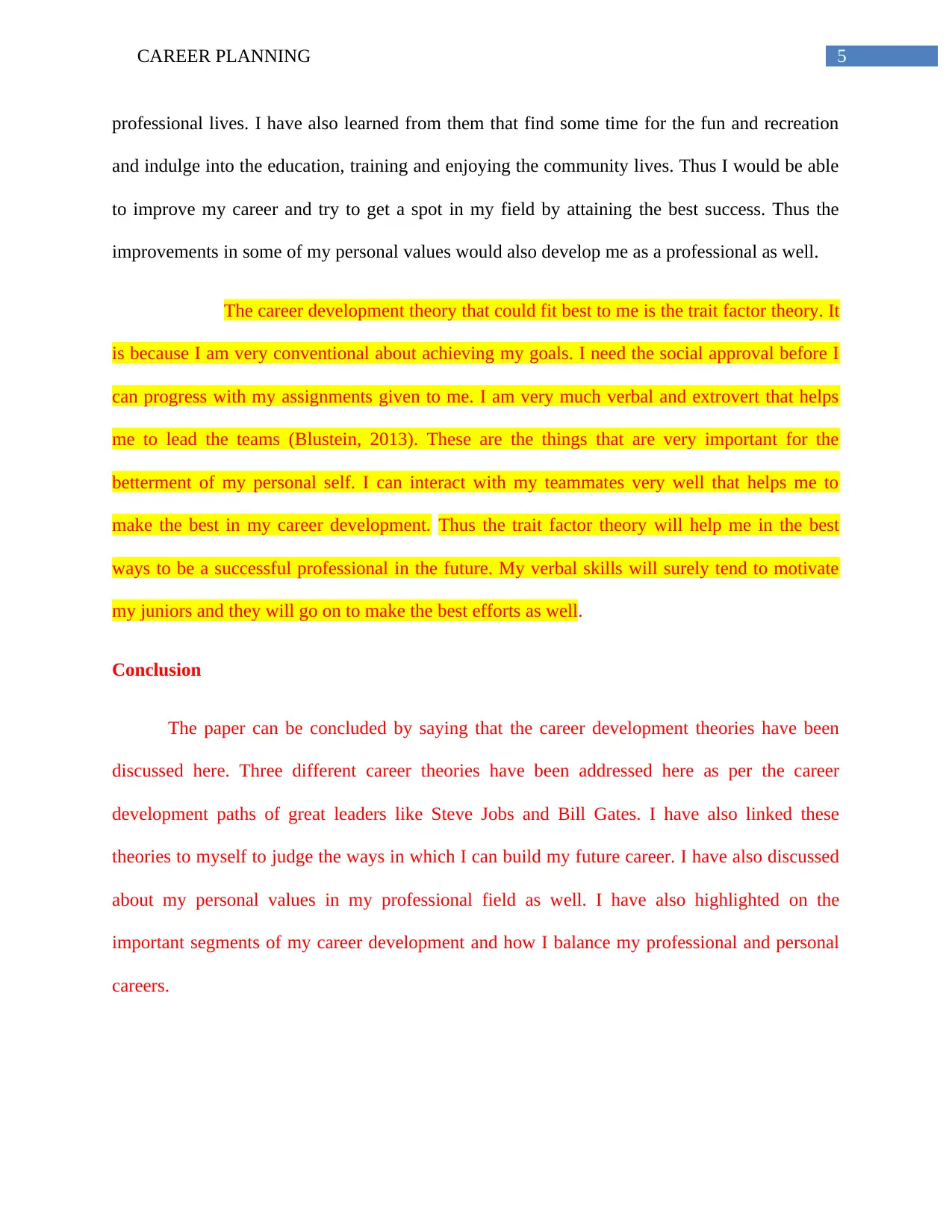
5CAREER PLANNING
professional lives. I have also learned from them that find some time for the fun and recreation
and indulge into the education, training and enjoying the community lives. Thus I would be able
to improve my career and try to get a spot in my field by attaining the best success. Thus the
improvements in some of my personal values would also develop me as a professional as well.
The career development theory that could fit best to me is the trait factor theory. It
is because I am very conventional about achieving my goals. I need the social approval before I
can progress with my assignments given to me. I am very much verbal and extrovert that helps
me to lead the teams (Blustein, 2013). These are the things that are very important for the
betterment of my personal self. I can interact with my teammates very well that helps me to
make the best in my career development. Thus the trait factor theory will help me in the best
ways to be a successful professional in the future. My verbal skills will surely tend to motivate
my juniors and they will go on to make the best efforts as well.
Conclusion
The paper can be concluded by saying that the career development theories have been
discussed here. Three different career theories have been addressed here as per the career
development paths of great leaders like Steve Jobs and Bill Gates. I have also linked these
theories to myself to judge the ways in which I can build my future career. I have also discussed
about my personal values in my professional field as well. I have also highlighted on the
important segments of my career development and how I balance my professional and personal
careers.
professional lives. I have also learned from them that find some time for the fun and recreation
and indulge into the education, training and enjoying the community lives. Thus I would be able
to improve my career and try to get a spot in my field by attaining the best success. Thus the
improvements in some of my personal values would also develop me as a professional as well.
The career development theory that could fit best to me is the trait factor theory. It
is because I am very conventional about achieving my goals. I need the social approval before I
can progress with my assignments given to me. I am very much verbal and extrovert that helps
me to lead the teams (Blustein, 2013). These are the things that are very important for the
betterment of my personal self. I can interact with my teammates very well that helps me to
make the best in my career development. Thus the trait factor theory will help me in the best
ways to be a successful professional in the future. My verbal skills will surely tend to motivate
my juniors and they will go on to make the best efforts as well.
Conclusion
The paper can be concluded by saying that the career development theories have been
discussed here. Three different career theories have been addressed here as per the career
development paths of great leaders like Steve Jobs and Bill Gates. I have also linked these
theories to myself to judge the ways in which I can build my future career. I have also discussed
about my personal values in my professional field as well. I have also highlighted on the
important segments of my career development and how I balance my professional and personal
careers.
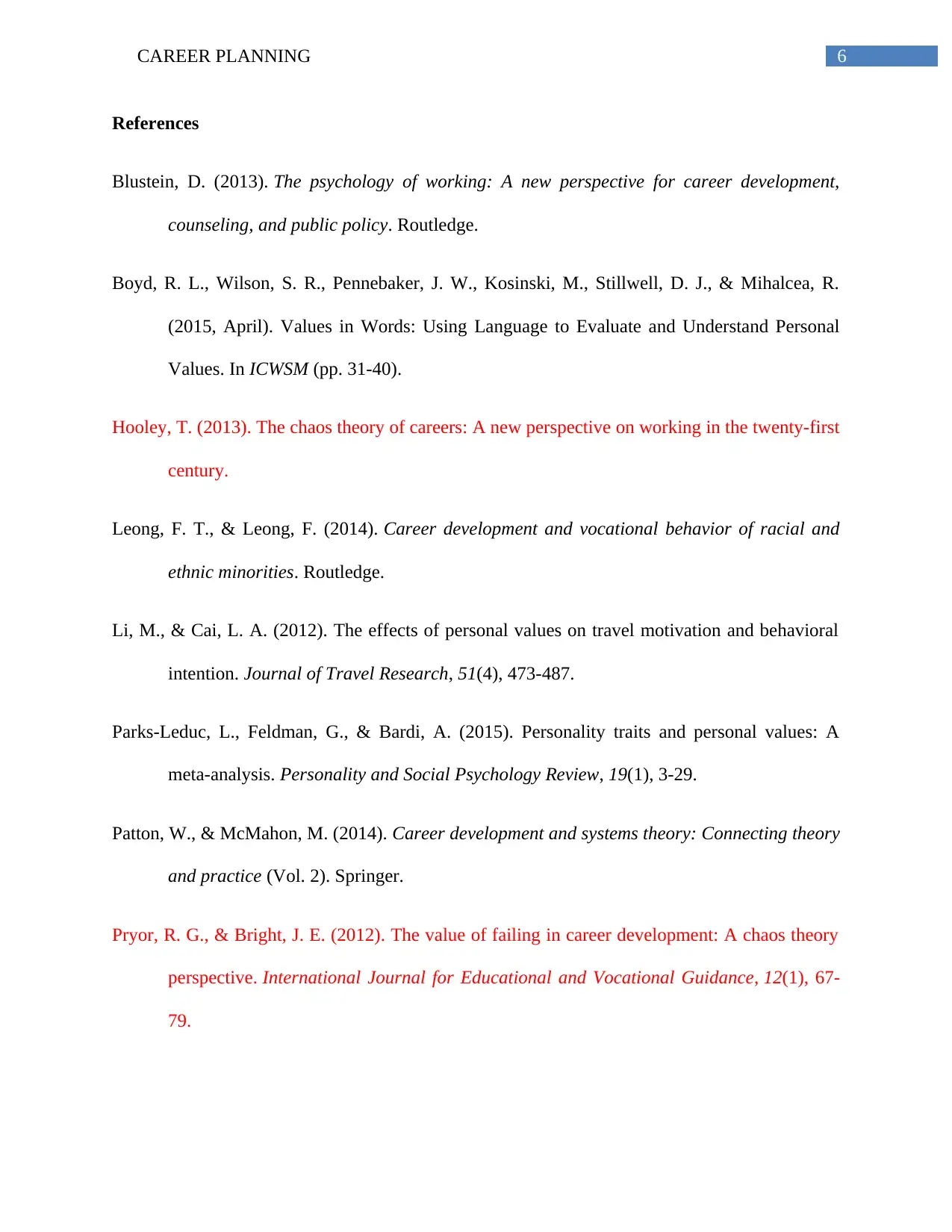
6CAREER PLANNING
References
Blustein, D. (2013). The psychology of working: A new perspective for career development,
counseling, and public policy. Routledge.
Boyd, R. L., Wilson, S. R., Pennebaker, J. W., Kosinski, M., Stillwell, D. J., & Mihalcea, R.
(2015, April). Values in Words: Using Language to Evaluate and Understand Personal
Values. In ICWSM (pp. 31-40).
Hooley, T. (2013). The chaos theory of careers: A new perspective on working in the twenty-first
century.
Leong, F. T., & Leong, F. (2014). Career development and vocational behavior of racial and
ethnic minorities. Routledge.
Li, M., & Cai, L. A. (2012). The effects of personal values on travel motivation and behavioral
intention. Journal of Travel Research, 51(4), 473-487.
Parks-Leduc, L., Feldman, G., & Bardi, A. (2015). Personality traits and personal values: A
meta-analysis. Personality and Social Psychology Review, 19(1), 3-29.
Patton, W., & McMahon, M. (2014). Career development and systems theory: Connecting theory
and practice (Vol. 2). Springer.
Pryor, R. G., & Bright, J. E. (2012). The value of failing in career development: A chaos theory
perspective. International Journal for Educational and Vocational Guidance, 12(1), 67-
79.
References
Blustein, D. (2013). The psychology of working: A new perspective for career development,
counseling, and public policy. Routledge.
Boyd, R. L., Wilson, S. R., Pennebaker, J. W., Kosinski, M., Stillwell, D. J., & Mihalcea, R.
(2015, April). Values in Words: Using Language to Evaluate and Understand Personal
Values. In ICWSM (pp. 31-40).
Hooley, T. (2013). The chaos theory of careers: A new perspective on working in the twenty-first
century.
Leong, F. T., & Leong, F. (2014). Career development and vocational behavior of racial and
ethnic minorities. Routledge.
Li, M., & Cai, L. A. (2012). The effects of personal values on travel motivation and behavioral
intention. Journal of Travel Research, 51(4), 473-487.
Parks-Leduc, L., Feldman, G., & Bardi, A. (2015). Personality traits and personal values: A
meta-analysis. Personality and Social Psychology Review, 19(1), 3-29.
Patton, W., & McMahon, M. (2014). Career development and systems theory: Connecting theory
and practice (Vol. 2). Springer.
Pryor, R. G., & Bright, J. E. (2012). The value of failing in career development: A chaos theory
perspective. International Journal for Educational and Vocational Guidance, 12(1), 67-
79.
Paraphrase This Document
Need a fresh take? Get an instant paraphrase of this document with our AI Paraphraser
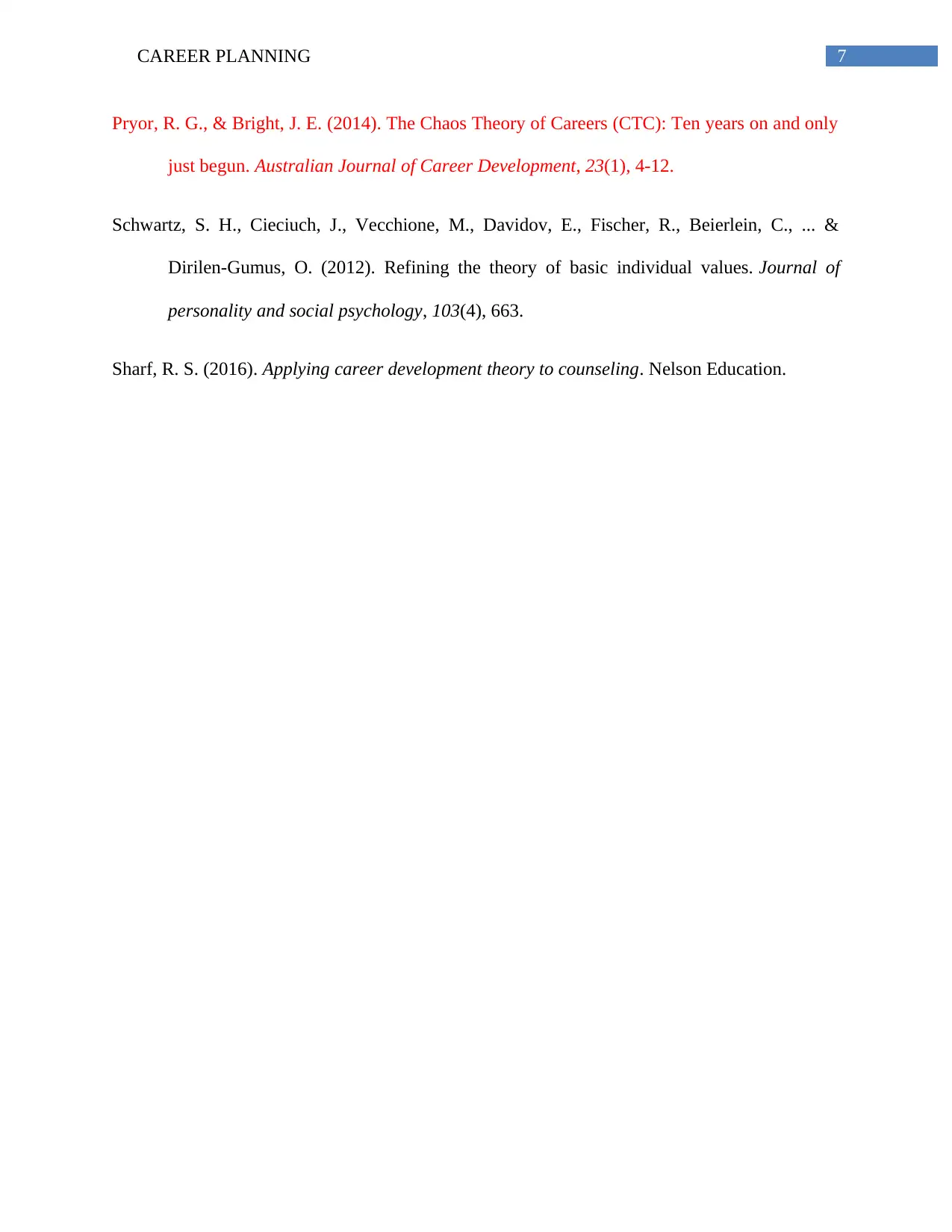
7CAREER PLANNING
Pryor, R. G., & Bright, J. E. (2014). The Chaos Theory of Careers (CTC): Ten years on and only
just begun. Australian Journal of Career Development, 23(1), 4-12.
Schwartz, S. H., Cieciuch, J., Vecchione, M., Davidov, E., Fischer, R., Beierlein, C., ... &
Dirilen-Gumus, O. (2012). Refining the theory of basic individual values. Journal of
personality and social psychology, 103(4), 663.
Sharf, R. S. (2016). Applying career development theory to counseling. Nelson Education.
Pryor, R. G., & Bright, J. E. (2014). The Chaos Theory of Careers (CTC): Ten years on and only
just begun. Australian Journal of Career Development, 23(1), 4-12.
Schwartz, S. H., Cieciuch, J., Vecchione, M., Davidov, E., Fischer, R., Beierlein, C., ... &
Dirilen-Gumus, O. (2012). Refining the theory of basic individual values. Journal of
personality and social psychology, 103(4), 663.
Sharf, R. S. (2016). Applying career development theory to counseling. Nelson Education.
1 out of 8
Related Documents
Your All-in-One AI-Powered Toolkit for Academic Success.
+13062052269
info@desklib.com
Available 24*7 on WhatsApp / Email
![[object Object]](/_next/static/media/star-bottom.7253800d.svg)
Unlock your academic potential
© 2024 | Zucol Services PVT LTD | All rights reserved.





